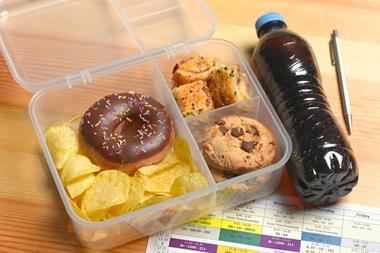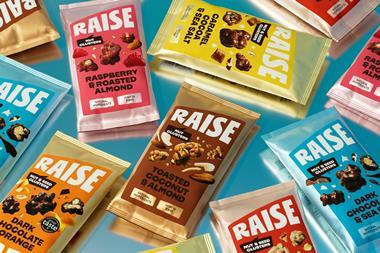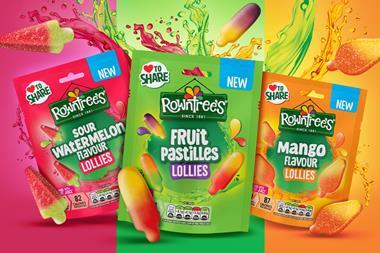Introduce carefully selected new and premium lines, without neglecting your core range, and you can bag your share of the savoury snacks market. Rich Airey reports
With traditional savoury bagged snacks coming under fire in recent years from health campaigners, manufacturers have been forced to act quickly to reduce saturated fat and salt levels. And while the majority of brands in the category cannot be viewed as overtly healthy, an increase in the number of better-for-you lines has undoubtedly helped produce growth of 3.1% in the £1.9bn category.
With such a busy sector - there were close to 200 new product launches in the UK last year - it's important that retailers select the right lines. By carefully introducing new product developments without compromising on the best sellers,
c-store retailers should be able to benefit from a roaring trade in savoury snacks at all hours.
Convenience director at PepsiCo David Biggs says retailers should initially concentrate on developing the correct core range. "Health is obviously a key trend but the other really interesting angle is the strength of the top-selling products where we're seeing double digit growth," he explains. "Our top products such as Walkers cheese & onion, salt & vinegar and ready salted, as well as the Quavers and Monster Munch brands, are all enjoying an average of 11% year-on-year growth."
Biggs believes the challenge for retailers is to generate excitement at the fixture with selected new lines without compromising on the established best sellers. The launch of interesting flavours - such as the recently introduced Walkers chilli & lemon - designed to have mass appeal but also developed specifically for the tastes of the Asian market, is just one way retailers can achieve this.
"We're expecting even stronger growth in the next six months," he says. "Our 'Great British Potatoes' campaign will drive sales and we've also recently reintroduced Worcester sauce flavour. Early indications are that it's selling very well."
PepsiCo has also relaunched three brands aimed mainly at younger consumers - Monster Munch, Squares and French Fries - with a average 80% reduction in fat. "This has also resulted in double digit growth," says Biggs. "It was without a doubt the right move."
While a large majority of a
c-store's savoury bagged snacks sales will come from lunchtime trade as customers pick up a pack of crisps with a sandwich, retailers must not neglect early evening custom, where shoppers will be looking out for sharing products to enjoy on a night in.
Biggs points to the success of a current promotional tie-in with wine brand E&J Gallo. "Sensations 'Divine with Wine' performed very well because a significant number of consumers enjoy snacks with wine and other drinks in the evenings.
Nuts also represent a real opportunity. They extend usage into the evening and are helping to drive everyday snacking."
Nobby's Nuts now have an 18% share in the c-store sector. The range recently benefited from the introduction of almond and cashew variants, a new look and a resealable pack format. Biggs adds: "Both Sensations and Nobbby's Nuts are good examples of the growth of more premium products. Retailers need to address the premium opportunity but not at the expense of their core range."
Rival manufacturer United Biscuits has also been busy reducing salt and fat levels in its snacks portfolio. It has also introduced new healthier lines such as multigrain Hula Hoops.
Trade PR & communications manager at UBUK Jessica Wylie believes that while shoppers are increasingly checking the ingredients of products, the demand for a treat still exists.
"While people are looking to be healthy at the start of the week they are also looking for treats as they get towards the end of it," she says. "UBUK has identified three mega trends driving the snacking category - health, pleasure and convenience. We've responded to health concerns by reformulating right across our range with reductions of up to 55% in saturated fat.
"Other recent moves include the launch of multigrain Hula Hoops and early indications are that they're performing well. We were the first company to remove certain fats from our products but it's not only about taking ingredients out; it's about putting them in."
UBUK has benefited from the pleasurable trend with its McCoys Specials and Specials Tortilla brands currently up 3.9%. Together these brands have grown the category by £15m.
Wylie also believes the nuts category holds huge potential for
c-store retailers and points to the success of UBUK's KP Big Nuts.
"Of lapsed nuts eaters, 49% have recently returned to the category," she says, "which was previously quite grocery focused, but products such as Big Nuts and the addition of interesting new flavours have made it much more suited to the convenience sector."
Wylie emphasises the importance of merchandising for the snack category and suggests retailers make use of additional counter display units recently introduced by UBUK.
"It's worth retailers installing secondary sites in high footfall areas and on the ends of aisles," she says. "They should also make sure the big brands are dual faced and out-of-stocks are avoided. Customers hate to reach into a box for a bag of crisps and find it's almost empty. It's important to keep stock topped up and rotated."
Wylie also recommends cross-merchandising and offering meal deals with products from the chiller. Looking at the future of the category she adds: "Current trends are set to continue and we're likely to see an increase in consumers' and manufacturers' environmental concerns. There will be lots more product development next year with specific activity for the convenience sector."
Another big seller in the convenience sector is P&G's Pringles brand. Both on-the-go and at home snacking are now catered for since the launch of the Mini Pringles range. The launch of Pringles Rice is also being supported with a TV ad campaign, and P&G is pleased with early sales data of the new variant. To help retailers boost profits, P&G has developed ShelfHelp, which focuses on a number of categories, including crisps.
Trade communications manager Paul Lettice explains: "P&G is constantly trying to invigorate the market and develop ways for retailers to build their business. ShelfHelp is a programme that incorporates hints and standards that are easy to implement, ultimately helping the retailer to better meet the needs of the consumer."
Lettice advises: "Retailers should group products together, ensure price and product labels are correctly positioned and keep shelves clean, well maintained and well stocked. Gaps and out-of-stocks just frustrate shoppers."
According to recent Nielsen data, the handcooked crisps sector is continuing to show strong growth
of 18.7% year-on-year. At Kettle Chips, sales are up 23.5% with
the 40g single serve packs selling particularly well in c-stores.
Justin Burbage, head of sales at Kettle, believes there are a number factors contributing to the growth of the sector. He explains: "There's been an increase in the number of snacking occasions as well as in consumer awareness of what goes into their food. Shoppers are
looking for more natural products.
"Kettle Chips 40g provides an appropriate pack size for lunchtime consumption and on-the-go snacking. New flavour launches and seasonal ranges help to keep our portfolio fresh. Our commitment to innovation and new product development drives retail sales at significant times throughout
the year."
Burbage is confident the handcooked sector is set for further growth and adds: "We believe that consumers will continue to trade up to more premium crisps and snacks with added value through healthier and fewer processed ingredients."
Ken Brook-Chrispin, chief executive of Seabrook Crisps, agrees but adds that the sector isn't completely governed by health. "Certainly, consumers are looking to eat more healthily but they don't want to compromise on taste," he says.
Pointing to the company's new hot & spicy range he explains: "Flavour is king for indulgence and consumers are increasingly seeking out more unusual and adventurous products. Because of this, premium ingredients and decadent recipes are very much a growth area.
"At the same time the health drive is definitely here to stay. The challenge is to make the healthier options non-punitive by ensuring that they are as full of flavour as the indulgent ones."
Ryvita has added a new salt & vinegar variant to its Ryvita Minis range. The new flavour joins seven others in the range including mature Cheddar & onion, sweet chilli and cream cheese & chive.
As with all products in the range, the new variant contains 3% fat and has been rolled out this summer with an RRP of 49p per pack. Commenting on the launch, marketing director Rob Murray says: "A salt & vinegar flavour was an obvious addition to the current range of Ryvita Minis. We're confident that this new flavour will aid the growth of Ryvita Minis as well as the healthier snacking category overall."
Kettle Chips has upped its core range of flavours with the addition of four new variants. The flavours, which are available now, are roast chicken with rosemary & thyme, sour cream & chive, sweet chilli and honey barbecue. The new flavours, which follow all products in the range by containing only natural ingredients, replace two old recipes, salsa mesquite and mango chilli. All Kettle Chips are available in 150g bags, while the chilli and roast chicken flavours are also available in 40g packs. The snacks have RRPs of £1.39 and 49p respectively.
Pepsico has launched its first ever Walkers wholegrain snack in the UK. Sunbites, which exist under the name Sunchips in the US, are made with 67% wholegrain. The new snacks come in three flavours - original, sour cream & cracked black pepper and oven roasted onion & rosemary - and have an RRP of 41p. They are being supported with a £3m marketing spend and POS material.
1. Walkers original
2. McCoys
3. Pringles
4. Doritos
5. Hula Hoops
6. Quavers
7. Sensations
8. Kettle Chips
9. Mini Cheddars
10. Monster Munch
Source: Nielsen w/e July 14 2007
With traditional savoury bagged snacks coming under fire in recent years from health campaigners, manufacturers have been forced to act quickly to reduce saturated fat and salt levels. And while the majority of brands in the category cannot be viewed as overtly healthy, an increase in the number of better-for-you lines has undoubtedly helped produce growth of 3.1% in the £1.9bn category.
With such a busy sector - there were close to 200 new product launches in the UK last year - it's important that retailers select the right lines. By carefully introducing new product developments without compromising on the best sellers,
c-store retailers should be able to benefit from a roaring trade in savoury snacks at all hours.
Convenience director at PepsiCo David Biggs says retailers should initially concentrate on developing the correct core range. "Health is obviously a key trend but the other really interesting angle is the strength of the top-selling products where we're seeing double digit growth," he explains. "Our top products such as Walkers cheese & onion, salt & vinegar and ready salted, as well as the Quavers and Monster Munch brands, are all enjoying an average of 11% year-on-year growth."
Biggs believes the challenge for retailers is to generate excitement at the fixture with selected new lines without compromising on the established best sellers. The launch of interesting flavours - such as the recently introduced Walkers chilli & lemon - designed to have mass appeal but also developed specifically for the tastes of the Asian market, is just one way retailers can achieve this.
"We're expecting even stronger growth in the next six months," he says. "Our 'Great British Potatoes' campaign will drive sales and we've also recently reintroduced Worcester sauce flavour. Early indications are that it's selling very well."
PepsiCo has also relaunched three brands aimed mainly at younger consumers - Monster Munch, Squares and French Fries - with a average 80% reduction in fat. "This has also resulted in double digit growth," says Biggs. "It was without a doubt the right move."
While a large majority of a
c-store's savoury bagged snacks sales will come from lunchtime trade as customers pick up a pack of crisps with a sandwich, retailers must not neglect early evening custom, where shoppers will be looking out for sharing products to enjoy on a night in.
Biggs points to the success of a current promotional tie-in with wine brand E&J Gallo. "Sensations 'Divine with Wine' performed very well because a significant number of consumers enjoy snacks with wine and other drinks in the evenings.
Nuts also represent a real opportunity. They extend usage into the evening and are helping to drive everyday snacking."
Nobby's Nuts now have an 18% share in the c-store sector. The range recently benefited from the introduction of almond and cashew variants, a new look and a resealable pack format. Biggs adds: "Both Sensations and Nobbby's Nuts are good examples of the growth of more premium products. Retailers need to address the premium opportunity but not at the expense of their core range."
Rival manufacturer United Biscuits has also been busy reducing salt and fat levels in its snacks portfolio. It has also introduced new healthier lines such as multigrain Hula Hoops.
Trade PR & communications manager at UBUK Jessica Wylie believes that while shoppers are increasingly checking the ingredients of products, the demand for a treat still exists.
"While people are looking to be healthy at the start of the week they are also looking for treats as they get towards the end of it," she says. "UBUK has identified three mega trends driving the snacking category - health, pleasure and convenience. We've responded to health concerns by reformulating right across our range with reductions of up to 55% in saturated fat.
"Other recent moves include the launch of multigrain Hula Hoops and early indications are that they're performing well. We were the first company to remove certain fats from our products but it's not only about taking ingredients out; it's about putting them in."
UBUK has benefited from the pleasurable trend with its McCoys Specials and Specials Tortilla brands currently up 3.9%. Together these brands have grown the category by £15m.
Wylie also believes the nuts category holds huge potential for
c-store retailers and points to the success of UBUK's KP Big Nuts.
"Of lapsed nuts eaters, 49% have recently returned to the category," she says, "which was previously quite grocery focused, but products such as Big Nuts and the addition of interesting new flavours have made it much more suited to the convenience sector."
Wylie emphasises the importance of merchandising for the snack category and suggests retailers make use of additional counter display units recently introduced by UBUK.
"It's worth retailers installing secondary sites in high footfall areas and on the ends of aisles," she says. "They should also make sure the big brands are dual faced and out-of-stocks are avoided. Customers hate to reach into a box for a bag of crisps and find it's almost empty. It's important to keep stock topped up and rotated."
Wylie also recommends cross-merchandising and offering meal deals with products from the chiller. Looking at the future of the category she adds: "Current trends are set to continue and we're likely to see an increase in consumers' and manufacturers' environmental concerns. There will be lots more product development next year with specific activity for the convenience sector."
Another big seller in the convenience sector is P&G's Pringles brand. Both on-the-go and at home snacking are now catered for since the launch of the Mini Pringles range. The launch of Pringles Rice is also being supported with a TV ad campaign, and P&G is pleased with early sales data of the new variant. To help retailers boost profits, P&G has developed ShelfHelp, which focuses on a number of categories, including crisps.
Trade communications manager Paul Lettice explains: "P&G is constantly trying to invigorate the market and develop ways for retailers to build their business. ShelfHelp is a programme that incorporates hints and standards that are easy to implement, ultimately helping the retailer to better meet the needs of the consumer."
Lettice advises: "Retailers should group products together, ensure price and product labels are correctly positioned and keep shelves clean, well maintained and well stocked. Gaps and out-of-stocks just frustrate shoppers."
According to recent Nielsen data, the handcooked crisps sector is continuing to show strong growth
of 18.7% year-on-year. At Kettle Chips, sales are up 23.5% with
the 40g single serve packs selling particularly well in c-stores.
Justin Burbage, head of sales at Kettle, believes there are a number factors contributing to the growth of the sector. He explains: "There's been an increase in the number of snacking occasions as well as in consumer awareness of what goes into their food. Shoppers are
looking for more natural products.
"Kettle Chips 40g provides an appropriate pack size for lunchtime consumption and on-the-go snacking. New flavour launches and seasonal ranges help to keep our portfolio fresh. Our commitment to innovation and new product development drives retail sales at significant times throughout
the year."
Burbage is confident the handcooked sector is set for further growth and adds: "We believe that consumers will continue to trade up to more premium crisps and snacks with added value through healthier and fewer processed ingredients."
Ken Brook-Chrispin, chief executive of Seabrook Crisps, agrees but adds that the sector isn't completely governed by health. "Certainly, consumers are looking to eat more healthily but they don't want to compromise on taste," he says.
Pointing to the company's new hot & spicy range he explains: "Flavour is king for indulgence and consumers are increasingly seeking out more unusual and adventurous products. Because of this, premium ingredients and decadent recipes are very much a growth area.
"At the same time the health drive is definitely here to stay. The challenge is to make the healthier options non-punitive by ensuring that they are as full of flavour as the indulgent ones."
Product spots
Ryvita has added a new salt & vinegar variant to its Ryvita Minis range. The new flavour joins seven others in the range including mature Cheddar & onion, sweet chilli and cream cheese & chive.
As with all products in the range, the new variant contains 3% fat and has been rolled out this summer with an RRP of 49p per pack. Commenting on the launch, marketing director Rob Murray says: "A salt & vinegar flavour was an obvious addition to the current range of Ryvita Minis. We're confident that this new flavour will aid the growth of Ryvita Minis as well as the healthier snacking category overall."
Kettle Chips has upped its core range of flavours with the addition of four new variants. The flavours, which are available now, are roast chicken with rosemary & thyme, sour cream & chive, sweet chilli and honey barbecue. The new flavours, which follow all products in the range by containing only natural ingredients, replace two old recipes, salsa mesquite and mango chilli. All Kettle Chips are available in 150g bags, while the chilli and roast chicken flavours are also available in 40g packs. The snacks have RRPs of £1.39 and 49p respectively.
Pepsico has launched its first ever Walkers wholegrain snack in the UK. Sunbites, which exist under the name Sunchips in the US, are made with 67% wholegrain. The new snacks come in three flavours - original, sour cream & cracked black pepper and oven roasted onion & rosemary - and have an RRP of 41p. They are being supported with a £3m marketing spend and POS material.
Top 10 impulse crisps and snack brands
1. Walkers original
2. McCoys
3. Pringles
4. Doritos
5. Hula Hoops
6. Quavers
7. Sensations
8. Kettle Chips
9. Mini Cheddars
10. Monster Munch
Source: Nielsen w/e July 14 2007
































No comments yet